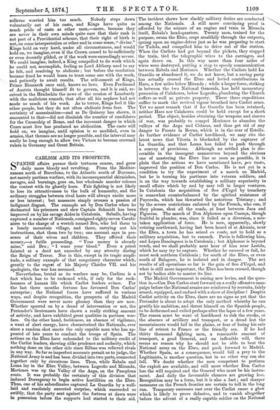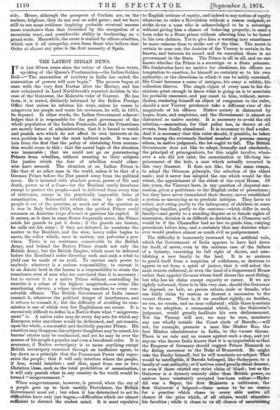CARLISM AND ITS PROSPECTS.
SP.ANISH affairs pursue their tortuous course, and grow daily more bloody and revolting. From the Mediter- ranean north of Barcelona, to the Atlantic south of Bayonne, not merely partisan warfare, with its inconsequential skirmishes, ravages, and burnings, goes on, but wholesale murder colours the contest with its ghastly hues. Fair fighting is not likely to lose its attractiveness to the bulk of humanity, and the ordinary struggles between rival hosts will always excite more or less interest; but massacre simply arouses a passion of indignant disgust. The example set by Don Carlos when he decimated his prisoners and slew Captain Schmidt has been improved on by his savage Aides in Catalonia. Saballs, having captured a number of Nationals, consigned eighty-seven Carabi- -niers to the charge of a wretch named Bra, who led them to a lonely mountain village, and there, carrying out his instructions, shot them two by two; one account says in pre- sence of their wives and children. They offered their money,—a futile proceeding. "Your money is already mine," said Bra; "I want your blood." Even a priest fainted at a deed not exceeded by any atrocity during the Reign of Terror. Nor is this, except in its tragic ampli- tude, a solitary example of that sanguinary character which, greatly to the regret of his Majesty Charles VII. and his apologists, the war has assumed.
Nevertheless, brutal as its warfare may be, Carlism is a fact which has to be reckoned with, if only for the reck- lessness of human life which Carlist leaders evince. For the last three months fortune has favoured Don Carlos' enterprise ; the National forces have suffered in various ways, and despite recognition, the prospects of the Madrid Government were never more gloomy than they are now. Whether spurred on by a dread of intervention or not, the Pretender's lieutenants have shown a really striking amount of activity, and have exhibited great qualities in partisan war- fare. On the other hand, feebleness, an absence of vigilance, a want of alert energy, have characterised the Nationals, ever .since a random shot smote the only capable man who has ap- peared of late years to conduct the troops of Spain. The .actions on the Ebro have redounded to the military credit of the Carlist leaders, showing alike prudence and audacity, which nothing done on the other side since Bilbao was relieved rivals in any way. So far as imperfect accounts permit us to judge, the National Army is and has been divided into two parts, connected together only by circuitous lines. Thus, while Zabala and Loma lay in the Ebro Valley, between Logroflo and Miranda, Moriones was up the Valley of the Arga, on the Pamplona route. It was probably the certainty of this division that induced Dorregaray to begin active hostilities on the Ebro. Thus, one of his subordinates captured La Guardia by a well- laid and resolutely executed surprise, which succeeded so swiftly, that the party sent against the fortress at dawn were in possession before the supports had started to their aid. The incident shows how slackly military duties are conducted among the Nationals. A still more convincing proof is afforded by the seizure of an engine and train in Miranda itself, Zabala's head-quarters. Twenty men, trained for the purpose, swam the Ebro, crept stealthily through the outposts, sprang upon an engine-driver just as he was preparing to start for Tudela, and compelled him to drive out of the station. When the Carlists had got beyond the pickets, they stopped the train, tied the telegraphic wires to the carriages, and again drove on. In this way more than four miles of wires were destroyed, putting a stop to speedy communication between Zabala and Moriones. Whether the Carlists held La Guardia or abandoned it, we do not know, but a roving party has actually crossed the Ebro and levied contributions in Haro, a few miles below Miranda ; while a larger force, striking in between the two National Generals, has held momentary possession of Calahorra., below Logrorto, plundering the Church coffers as well as private property. These three expeditions suffice to mark the revived vigour breathed into Carlist arms. Yet we must remark that if La Guardia has been retained, neither Haro nor Calahorra could be held except for a short period. The object, besides obtaining the weapons and sinews of war, was probably to compel Moriones to abandon the valleys of the Arga and Cidacos, and thus get rid of any danger to Puente la Reyna, which is in the rear of Estella. As further evidence of Carlist hardihood, we may cite the latest news that Vitoria is blockaded by the capturer of La Guardia, and that Loma has failed to push through a convoy of provisions. Although no settled plan is dis- cernible in the insurgent manoeuvres beyond the obvious one of mastering the Ebro line as soon as possible, it is plain that the actions we have mentioned have, pro tanto, improved the position of Don Carlos. He is not yet in a. condition to try the experiment of a march on Madrid, but he is turning his partisans into veteran soldiers, and. is on the way towards establishing a military superiority in small affairs which by and by may tell in larger ventures. In Catalonia the acquisition of Seo d'Urgel by treachery is somewhat counterbalanced by the spirited resistance of Puyeerda, which has thwarted the notorious Tristany ; and by the severe restrictions enforced by the French, who can, if they please, shut all the roads, at least between Jaca and Figueras. The march of Don Alphonso upon Cuenca, though fruitful in plunder, was, since it failed as a diversion, a mis- taken application of force. He is now, apparently, slowly retiring northward, having last been heard of at Alcaniz, near the Ebro, a town he has seized en route, not to hold as a military acquisition, but to ransack. Pavia is following him, and Lopez Dominguez is in Catalonia ; but Alphonso is beyond reach, and we shall probably next hear of him near Lerida, which he may try to capture. Whether he succeed or fail, he must seek northern Catalonia ; for south of the Ebro, or even south of Balaguer, he is isolated and in danger. The net results of all operations so far is the gain of Seo d'lJrgel, and what is still more important, the Ebro has been crossed, though not by bodies able to master its line.
The Madrid Government is raising new levies, and the ques- tion is,—Can Don Carlos start forward on a really offensive cam- paign before the National armies are reinforced by recruits, fairly armed, equipped, and endued with a show of discipline ? Despite Carlist activity on the Ebro, there are no signs as yet that the Pretender is about to adopt the only method whereby he can gratify his ambition, and thrust himself on the Spanish people, to be dethroned and exiled perhaps after the lapse of a few years. The reason must be want of hardihood to risk the stroke, or the absence of artillery and transport, or a dread lest the mountaineers would fail in the plains, or fear of losing his safe line of retreat to France or the friendly sea. If he had thirty thousand fighting men, a reasonable amount of transport, a good General, and an inflexible will, there seems no reason why he should not be able to beat the National array on the Ebro, and push forward to Madrid. Whether Spain, as a consequence, would fall a prey to the Legitimists, is another question, but in no other way can she fall. We doubt whether the men competent to perform the exploit are available, and still more whether Don Carlos has the will required and the General who must be his instru- ment. And daily the favourable chances are growing less. Recognition may be a form, but it is also a fact ; and sharper measures on the French frontier are certain to tell in the long run. Temporary successes cast over the Carlist cause a glow which is likely to prove delusive, and to vanish altogether before the advent of a really capable soldier on the National side.. Hence, although the prospects of Carlism are, on the to English notions of equity, and indeed to any notion of equity surface, brighter, they do not rest on solid gains ; and we have still to see some evidence implying probable eventual success more conclusive than that furnished by the occupation of a mountain tract, and considerable ability in freebooting on a grand scale. Meanwhile, the cause is stained by odious cruelties, which cost it all sympathy, even from those who believe that Order at almost any price is the first necessity of Spain.































 Previous page
Previous page